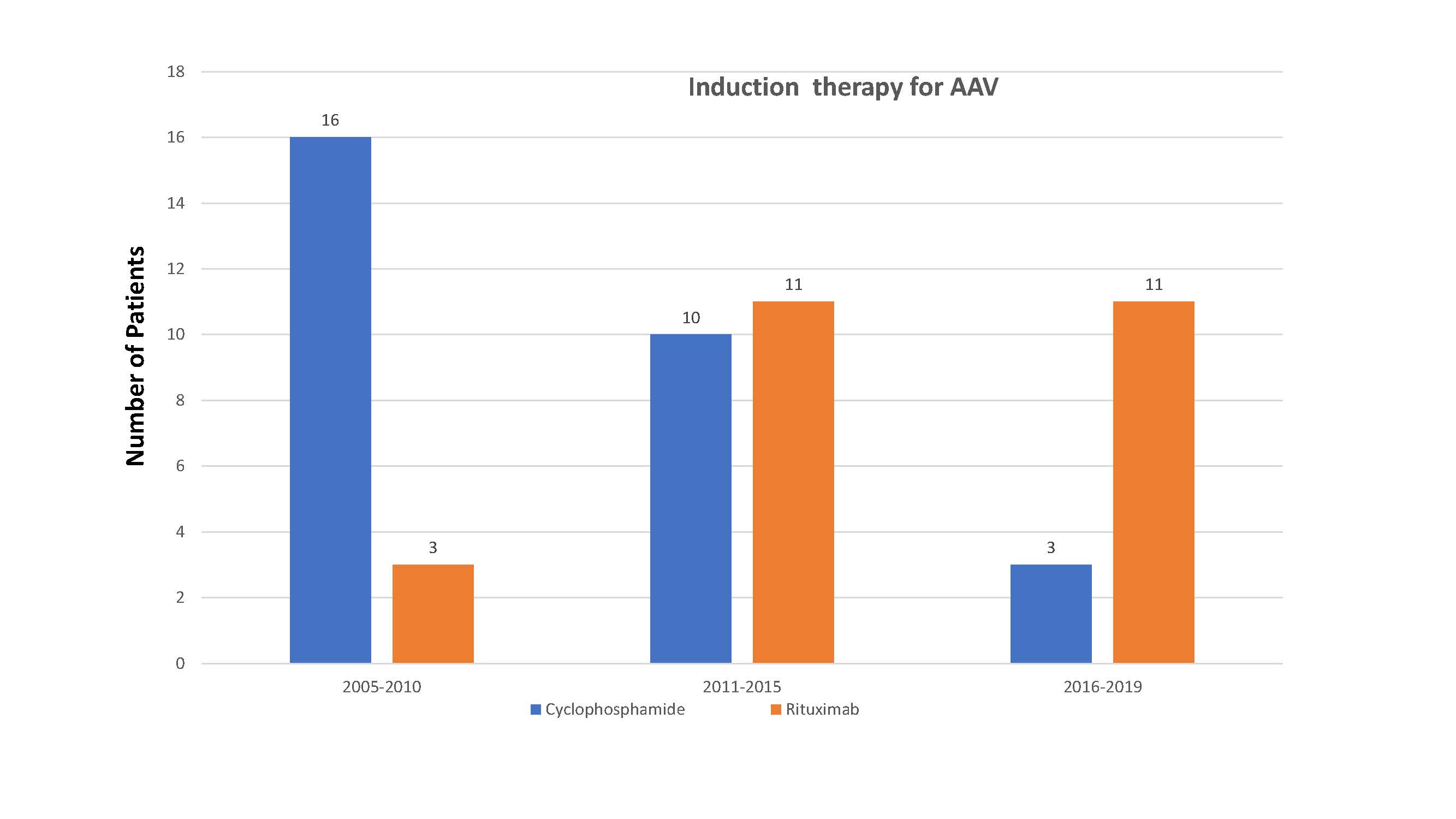Session Information
Session Type: Poster Session (Tuesday)
Session Time: 9:00AM-11:00AM
Background/Purpose: For years, cyclophosphamide (CYC) has been the primary treatment for severe anca-associated vasculitides (AAV) and has significantly improved disease related mortality. In addition, maintenance therapy, traditionally with methotrexate (MTX) or azathioprine (AZA), is imperative in preventing relapse. Since the approval of rituximab (RTX) for potential induction and maintenance therapy of AAV, it is unclear how substantially rheumatologists have responded and altered their treatment approach. we evaluated changes in treatment and disease outcomes of AAV at a large medical center.
Methods: IRB approval was obtained for medical record review of patients with diagnoses of AAV at an academic medical center. Consecutive patients seen between 2005 and 2019 were evaluated for diagnosis year, demographics, disease characteristics, induction and maintenance therapies, and remission and relapse. Patients who had sufficient disease severity to receive either CYC or RTX induction were included. Three time periods were evaluated based on diagnosis year, 2005-2010, 2011-2015, and 2016-2019 and data analyzed using chi-squared for differences in medication use and disease outcomes between time periods and medication regimens.
Results: Fifty-four patients (mean age 58±18 years, 74% female, 28 PR3 positive, 20 MPO positive and 6 both PR3/MPO) who received either RTX or CYC for remission induction were included in the final analysis. The use of RTX for induction increased significantly (p=0.001) during each study time period, from 19%, 53%, and 73%, respectively (Figure 1). However, RTX use for maintenance therapy did increase, but not significantly, from 21% to 50% (p=0.081) (Figure 2). There was no significant difference in the rate of remission following induction therapy during each study time period (63%, 66%, and 75%, respectively, p=0.191). Similarly, the relapse rate was not different during these three time periods (52%, 50%, and 36%, respectively, p=0.167).
At 6 months, 64% (35/54) patients achieved remission at 6 months. There was no significant difference in the achievement of remission between CYC (18/29) and RTX (17/25) (p=0.467). During long term follow-up, 46% (24/54) of patients relapsed. The risk of relapse was significantly lower in the RTX induction group 28% (7/25) compared to CYC group 58%(17/29) (p=0.018). Interestingly, rates of relapse on maintenance therapy were significantly (p=0.042) lower with RTX (36%) and AZA (36%) versus MTX (71%).
Conclusion: Following the approval of RTX for treatment of AAV, its use has significantly increased for induction therapy, however, not for maintenance therapy. This may be due to the lack of clear guidelines and data for optimal maintenance regimens. There were no differences in disease remission at 6 months in CYC vs RTX groups, however, relapses appeared to be fewer in those induced with RTX. Interestingly, the risk of relapse was higher in MTX maintenance group compared to AZA or RTX. These results are promising, suggesting that real world outcomes are mirroring what was seen in larger clinical trials. However, it suggests the need for more studies and guidelines regarding optimal management strategies for maintenance therapy in AAV.
To cite this abstract in AMA style:
Afroz S, Shakoor N. Changing Trends in the Management of ANCA-associated Vasculitis at an Academic Medical Center [abstract]. Arthritis Rheumatol. 2019; 71 (suppl 10). https://acrabstracts.org/abstract/changing-trends-in-the-management-of-anca-associated-vasculitis-at-an-academic-medical-center/. Accessed .« Back to 2019 ACR/ARP Annual Meeting
ACR Meeting Abstracts - https://acrabstracts.org/abstract/changing-trends-in-the-management-of-anca-associated-vasculitis-at-an-academic-medical-center/


